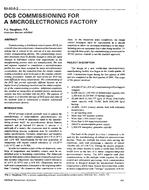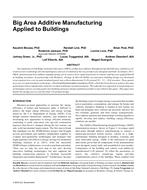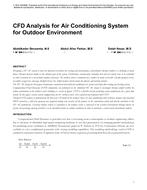Track: Modeling Throughout the Building Life Cycle
Sponsor: 9.10 Laboratory Systems, SSPC 62.1
Chair: Kelley Cramm, P.E., Member, Henderson Engineers, Overland Park, KS
Current design guidance for laboratories generally relies on specifying minimum air change rates (ACR) to insure indoor air quality and lab safety. This session presents a case study that used modeling and empirical testing combined to demonstrate the limitations of relying on air change rates alone when designing laboratory ventilation systems. The case study also explores what criteria is important, and how it should be used to design a safe and effective air distribution system.
1. Case Study of a Model to Evaluate Ventilation Effectiveness in Labs.
Kishor Khankari, Ph.D., Fellow ASHRAE, AnSight LLC, Ann Arbor, MI
This presentation highlights a case study where computational fluid dynamics (CFD) is used to model chemical spills with varying ACR and supply and exhaust configurations in a laboratory. The results demonstrate that conditions are not typically well-mixed or uniform, and making this assumption may produce erroneous results. The discussion includes the effect of airflow paths, strengths and locations of contaminant sources and locations of heat sources. Strategies for measures to improve effective contaminant removal will be included.
2. Case Study of an Empirical Test to Evaluate Ventilation Effectiveness in Labs
Thomas Smith, Member, Exposure Control Technologies, Inc., Cary, NC
Laboratory ventilation systems serve to reduce exposure risk and provide environmental conditioning. Air change rates (ACR) are often specified to achieve these objectives. This presentation discusses the same case study where an empirical tracer gas test was developed and used to evaluate whether ACR alone provided dilution and removal of airborne chemicals. Parameters were analyzed over the same range of rates with varying supply and exhaust coverage that were used in the CFD model previously presented. Recommendations on additional strategies to improve ventilation effectiveness in labs are also presented.
Presented: Sunday, January 21, 2018, 9:45-10:45 AM
Run Time: 60 min.
This is a zip file that consists of PowerPoint slides synchronized with the audio-recording of the speaker (recorded presentation), PDF files of the slides, and audio only (mp3) for each presentation.
Citation: ASHRAE Seminar Recordings, 2018 Winter Conference, Chicago, IL
Product Details
- Published:
- 2018
- Units of Measure:
- Dual
- File Size:
- 1 file , 68 MB
- Product Code(s):
- D-CH18Sem04


